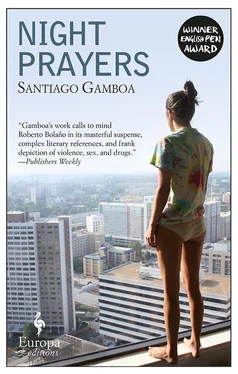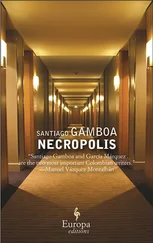Suddenly I remembered my conversation with Manuel:
“What makes me a fragile person is having been unhappy in my childhood,” he had said.
I recalled that I had looked at him in silence and said nothing, but had thought: what made me fragile was the opposite, having been happy. What of it? Then Manuel had thought for a moment and added: Life, when you come down to it, always presents you with an unusual bill to pay. That’s why Marx said that in history, events happen first as tragedy and then are repeated as comedy.
By the time Juana left the temple, she seemed transformed. Her smile was clearer, and you had less sense of storms inside her. It may have been an effect of the light or my own nervousness. I don’t know. Then we went for a walk. I showed her a number of places: India Gate, Connaught Place, Gandhi’s house, Indira’s house, the mansions of Golf Links and the architecture of Sundar Nagar. That night we had dinner at the Balluchi, in Hauz Khas Village, because apart from Punjabi food they had Kingfisher beer in green bottles, the ones with the highest alcohol content.
I didn’t want to pressure her, but I was intrigued to hear about her life, what had led her to leave everything so drastically, her adventures in Japan, her relationship with Jaburi, who by now must have been desperate, hitting the walls and howling with anger. Had she left him a note? had she promised him she would come back after seeing her brother? what were her plans?
“When you feel up to it, you could tell me something about your life,” I said to her, “whatever you like. I’m curious. Manuel told me a few things.”
A shadow passed over her face. It only lasted a second, but it was noticeable. Her eyes were no longer at peace.
“Does he know I went to Tokyo to…?”
I didn’t see any point in hiding it. “He knows everything,” I said, “that’s why he went looking for you.”
There was a grave look on her face now. She seemed about to say something, but no words came out.
“You decide, if you like,” I said. “When it comes down to it, you don’t have to tell me anything.”
She looked at me. Her eyes were like rays.
“It’s all right, Consul, but for now, do you mind if we sit for a while in silence?”
A couple of days went by. In the office I was still waiting for news from Bangkok that would make it possible for me to go back and deal with the case again. But everything seemed frozen.
The Consular Department continued its contacts with the Thai embassy in Bogotá, sending them a memorandum in which they asked if Manuel Manrique could be allowed to stand trial in Colombia. The embassy transmitted it to its ministry in Bangkok and we were still waiting for a reply, even if just a comment, anything that might allow negotiations to start. For the moment it was pointless to do anything, what with the travel expenses involved.
All I could do was wait.
The women servants in my apartment became fond of the child and one of them started taking him to the park in the afternoons so that he could play and see other children, thus giving Juana a bit of free time. She took the opportunity to read Vislumbres de la India by Octavio Paz. I would get home around seven-thirty, sometimes a little later, and we’d have a couple of gins until it was time for dinner. Then she’d lock herself in her room and I’d sit and read.
A week went by.
The following Thursday they were showing a Spanish film, Carlos Saura’s Cría Cuervos , at the Cervantes Institute. I suggested it to her and we went. She liked it. Another day she went with me to a book presentation at the India Habitat Center. Then to a literature event at the Alliance Française. There is a great deal of cultural life in Delhi. The Italo-Indian cultural center offered a program linking literature and food, and invited a group of people to sample dishes that had a connection with some of their most famous films. Juana was starting to feel at ease, or at least that’s what I thought. I was curious to know how she would justify having abandoned first her home, then Manuel, then her Iranian husband. How had her life in Tehran been? what was Jaburi like? would he put pressure on her about the child? would it be something like that sentimental film Not Without My Daughter , in which Iranian men were depicted as monsters? I had no idea. She still hadn’t made up her mind to tell me anything.
Faced with the absence of news from the Consular Department, I had to write to the Indian embassy in Bogotá asking for an extension of Juana’s visa and her child’s, which fortunately was conceded without their having to leave the country. After the attacks on the Oberoi and Taj hotels in Mumbai, which the Indians, imitating the Americans, call 26/11, India had modified the legislation concerning foreigners, introducing more requirements for obtaining or extending visas. Those who had six-month visas could no longer simply go to Nepal and stamp their passports, but had to wait two months to reenter India. Fortunately, this was not the case with Juana, thanks to the recommendation of the Indian embassy in Bogotá.
One day, in the middle of breakfast, she asked if her parents had been informed.
“Manuel asked me not to,” I said. “I passed that on to the legal department of our Foreign Ministry. Frankly, I don’t know.”
She was lost in thought, so I picked up the phone and offered it to her.
“Do you want to call them? Call them, you could talk for as long as you like.”
She looked at the phone, but immediately put it back on the table.
“No, thanks, I only wanted to know. When I see Manuel we’ll decide together what to do.”
Two more weeks passed and Juana started to get impatient. That was understandable. According to the lawyer in Bangkok, things were going well and we would soon have news. His friend in the police had assured him that they were about to make a big arrest of drug traffickers. We just had to be patient.
Juana bought a sari at Fabindia, a shop selling traditional clothes, with good bargains, and one night my Nepalese maid showed her how to put it on. What a curious and beautiful garment: twenty feet of brightly colored cloth, folded until it covers the body, leaving the midriff free, which is a matter of comfort and at the same time provocative. In their saris, all Indian women looked like princesses. The men, in their common drill trousers or jeans, were more like third-class servants, except when they wore kurtas or Punjabi-style vests.
When I got back from the office, I found Juana waiting for me in her sari. I praised her fulsomely, we drank a toast, then we got ready to go out. First to look at books at Full Circle, in the Khan Market, where you could drink tea on a terrace over which crows and vultures flew; Juana looked at everything with a certain casualness, as if she didn’t want to establish a close relationship with anything that she saw, or be too startled. Like a butterfly that flits from spot to spot. Later, we ate in the restaurant in Lodhi Gardens, which had good Indian lobster dishes.
Although her sari was compact, I thought I caught a glimpse of strange signs and images beneath it. Were they tattoos, I wondered, or a printed T-shirt?
Another day I invited some friends to the house. Among them was an unusual, very pleasant Colombian, Alexis von Hildebrand, who worked for Unicef, and who had lived in Madagascar for ten years. He was the only person I had ever met who had been to the islands of Tonga. His grandfather was a Catholic philosopher, a German, a friend of Nicolás Gómez Dávila. I also invited Sudeep Sen, poet and editor of a literary review in Delhi, the aspiring guru and my collaborator at the embassy, Madhuván “Rishiraj” Sharma, who was preparing himself by interpreting the Mahabharata , and of course my friend Professor Chattopadhyay. The group was completed by a Spanish-Indian couple, Lola McDougall and Nikhil Padgaonkar, poets and photographers, and the Catalan Óscar Pujol, director of the Cervantes Institute in Delhi and professor of Sanskrit at the University of Varanasi.
Читать дальше












